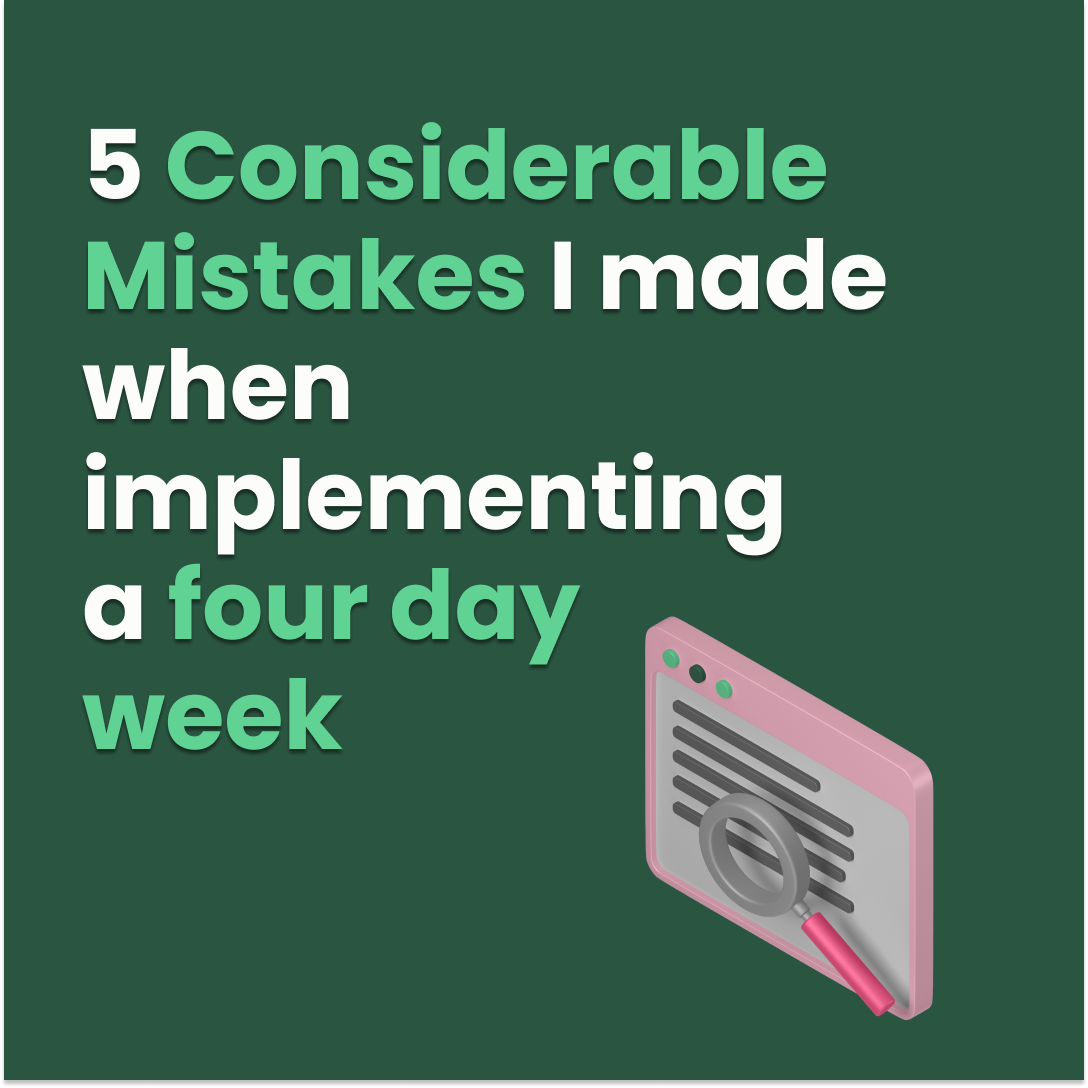In 2022, we decided to join 73 other companies in adopting a four day work week for our employees, with no loss of pay, as part of a nationwide six month trial. Now that the trial has come to an end, our CEO Claire Daniels reflects back on what she would’ve done differently.
1. Allowing employees to swap days off
When we were initially rolling out the four day week, there were a number of factors to consider, with one of the most important ones being which day people would have off. It was really important to me that we remained a 5-day week business, as we’re in the service industry our clients expect us to be available, so I didn’t want to change our operational hours. I then thought about the fact that the biggest benefit of a 4-day week would be to have a 3-day weekend, so that meant we’d split employees’ days off over Monday’s and Friday’s. This also meant we had three days every week where everyone was working and we could all get together as a business if needed.
I was pretty strict on people just having their set day off; it meant less of an admin headache if we had people wanting to swap all the time and ultimately, if you normally get Monday’s off but you want to take a Friday off, you can book it as a holiday as you usually would’ve done. As part of the 4-day week, annual leave allowance also stays the same as does pay, so people actually end up with a lot more holiday to use.
This is where the days off came up against an issue really, with holidays. As we’re a small team (there were 11 of us when we started the trial) that meant that on Mondays and Fridays we were down to 5 or 6 people in the office that day. If two people wanted to take the same week off, that would then leave as little as 3 people available on certain days. For the first time ever, I had to decline holiday requests as we were just going to be too short-staffed.
Now that we’re continuing the trial, we’ve changed some of the terms and I will now allow swapping of days off if it means people can have their holidays accepted, by arranging appropriate cover with someone else.
2. Not measuring productivity effectively
This is a funny one really, as the main reason we went into the 4-day week trial was to become more productive. When asked by others “how have you measured productivity” – which I get asked A LOT – I have two responses. My first being: “what do you use to measure productivity at the moment?” as I don’t believe there is a one size fits all metric for the increase in productivity from the 4-day week. Ultimately, whatever you use to measure your employees productivity currently, should be what you use if you implement the four day work week.
My second answer is “I’ll just know”, which is basically what I use to measure productivity at the moment. As a small business, it’s easy to see who is pulling their weight or not and if anyone is not being productive. I still stand by both of these responses, but I wish I had implemented a metric of our own before we started, just so that I could have seen if we improved, declined or stayed the same.
3. Talking to the press – unfiltered
I had to caveat this one with ‘unfiltered’, as we’ve had so much amazing press coverage from our participation in the 4 day week, including global TV appearances, radio interviews, digital and print media. However, when you start speaking to the press on a regular basis it’s easy to relax, and I’ve found myself caught out by things I’ve said.
At around the midway point of the trial, we had several calls from media outlets, including The Times and The Daily Mail, asking about what our challenges were with the trial. I was honest, stating that we generally saw very few challenges, but if I had to pick one I would say the hardest thing is getting recruitment right during the process. This is because I wanted to ensure we hired the right people, not just those who wanted to work a 4 day week. Additionally, onboarding new starters into the 4 day week and ensuring they had the right attitude about it as the existing staff have about it, could have been a challenge.
My honest feedback was taken and published across all major publications with headlines such as ‘Bosses say four day week isn’t working”. The frustration with this is I’d said quite the opposite, it was really working for us and we’d just had our best ever sales month on record, but I found a challenge to answer their questions honestly. I’ve learnt from that the hard way, but I’m still grateful for all the coverage we’ve received.
Side note: I’m also really happy to announce that we hired two new starters during the process and I had nothing to be worried about!
4. Having the wrong attitude about it
When I decided we were going to give the four day work week a try, I had mixed feelings about it. I wanted to do it for the benefit of the team and the business, but I was also deep down a bit sceptical about how it would work.
My personal view was that, although people would work shorter hours in a week, working only four days instead of five would probably mean that people would have to commit to working more over time and longer days to get their work done. I realise now, that it was completely the wrong attitude, as that isn’t how it needed to be at all. In fact, some of the most frequent over-workers during a five day week managed to leave on time more frequently on the four day week, as we gave them the tools to manage their time better.
One of the main things that helped us with this was the Diary Detox by Paul Holbrook, which we did as a workshop internally. This helps you to break down how you are spending your time at work, and on average at Trio we found that 20% of the working week was spent wasting time. We realised that if we solved that issue, no one had to do any additional work, they just had to be more efficient with their time and maintain productivity throughout the four days they were working.
5. Not doing it sooner
I’m pleased to say that after six months on the trial, it has been super successful for Trio and we’re now continuing the trial for another six months, before making a permanent decision.
We’ve had our ups and downs along the way, but the fact that I can give people a better work/life balance and still achieve the desired results for the business is hugely rewarding. We’ve had two of our best ever sales months on record during the four day week; we’ve also grown our team and grown our client base. We’ve performed 45% better financially year on year during the same months and 28% better financially than the previous period.
I’ve spent countless hours talking to other businesses about how to implement a four day work week into their business, and just really encourage anyone considering it to give it a go.
If you want to find out more about how I did it, join our webinar on 16th December at 1pm, where I’m joined by Paul Holbrook from Diary Detox and we’ll be sharing our tips to a happier, healthier work life by implementing the four day week. Sign up here.
For more information on the digital marketing services we provide, get in touch on 0113 357 0440.



